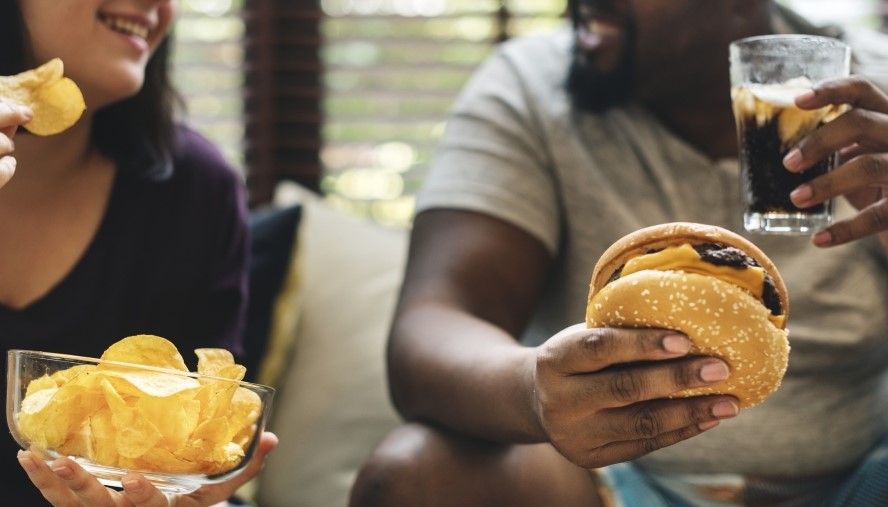The Effects of Ultra-Processed Foods on Your Heart Health
 Ultra-processed foods have become a mainstay of the American diet and a major culprit behind our increased rates of heart disease. According to a recent report from the Centers for Disease Control and Prevention, more than half of Americans consume these foods daily. Pre-packaged meals, frozen desserts and sugary drinks are staples in most households. While convenient and inexpensive, ultra-processed foods have been linked to obesity, diabetes, fatty liver disease and cancer. But their impact on the heart may be the most alarming of all.
Ultra-processed foods have become a mainstay of the American diet and a major culprit behind our increased rates of heart disease. According to a recent report from the Centers for Disease Control and Prevention, more than half of Americans consume these foods daily. Pre-packaged meals, frozen desserts and sugary drinks are staples in most households. While convenient and inexpensive, ultra-processed foods have been linked to obesity, diabetes, fatty liver disease and cancer. But their impact on the heart may be the most alarming of all.
What Are Ultra-Processed Foods?
According to cardiologist Andrew Freeman, MD, ultra-processed foods have been heavily modified from their original form and often come in packages or boxes with long shelf lives. They are typically made with added sugars, oils, fats, refined starches, salt and artificial additives, while offering little real nutrition.
Examples of Ultra-Processed foods
- Chips
- Cookies
- Crackers
- Energy drinks
- Frozen or ready-to-eat meals
- Pastries
- Processed meats like bacon and hot dogs
- Sodas
Even common foods with few ingredients, like potato chips, change dramatically when fried or heavily salted. “When you take a relatively nutritious food like a potato and fry it up, even though it has limited ingredients, it still becomes highly caloric. And we know that potatoes, particularly when they're fried, start to develop carcinogenic compounds,” explained Dr. Freeman. Due to their complex chemical nature, the danger of consuming these foods on a regular basis isn’t just about calories. As Dr. Freeman said, “The longer the shelf life, the shorter your life.”
How Processed Foods Cause Heart Disease
What makes these foods such a burden on the heart? For one thing, it’s the amount you’re consuming. According to Dr. Freeman, ultra-processed foods are designed to be addictive.
“These foods have been engineered to be highly delicious, with a soft texture. You think about some of these shelf-stable soft-baked cookies. The moment you taste one, it has the perfect amount of sweetness, softness and saltiness. Your body can't resist it. It’s what they say about potato chips. ‘You can’t have just one.’ That’s true about ultra-processed foods in general.”
This nutrient-poor, calorie-rich diet creates several pathways to heart disease. Sugar spikes and weight gain contribute to obesity, a major risk factor for heart problems. “Many of these foods contain huge quantities of salt, which can raise blood pressure,” Dr. Freeman noted. “And we know that blood pressure is an exponential risk factor for the development of heart disease.”
Additionally, some ultra-processed foods are high in cholesterol and inflammatory substances, both of which strain the cardiovascular system. And researchers are still learning about the risks posed by additives. “There’s been a whole variety of studies on artificial sweeteners in the last several years,” said Dr. Freeman. “Many of them are linked to increased cardiac event rates.”
How to Eat for a Healthier Heart
Ultra-processed foods may be difficult to avoid at first. However, there are some simple steps you can take to move toward better heart health. “I think the first step is to recognize that you’re consuming these things,” said Dr. Freeman. “The kids want it, the teenagers want it. They serve it at school. But you have to figure out how to choose differently.”
Cutting down on ultra-processed foods doesn’t have to mean giving them up overnight. Small changes can lower the risk of heart disease over time. Adjusting the way you shop for groceries also can have an impact. According to Dr. Freeman, sticking to the grocery store perimeter instead of going to the middle of the store can help. Fresh fruits, vegetables, beans and greens are staples that provide fiber, antioxidants and nutrients without added salt or sugar. “You can get a bag of salads that will last in your fridge for a few days or more and eat that for lunch,” Dr. Freeman suggested. “You can get a can of beans and throw it on top and use balsamic vinegar as your dressing. And now you have a very delicious, highly nutritious and filling unprocessed meal.”
Other strategies include rethinking breakfast and snacks. “Instead of having breakfast cereal, have oatmeal made with water and put some berries on top,” he said. “For kids, I usually recommend that they pack carrots,celery or an apple, rather than potato chips.”
It also helps to frame your diet as a return to a more traditional way of eating. Many of the problems with these foods result from their highly industrialized production. “At the end of the day, it’s about figuring out how to eat the way our grandparents’ grandparents did. That’s really the key,” Dr. Freeman said.
The shift doesn’t require extreme changes, but rather a steady move toward more natural, minimally processed foods. “Simple, but tasty food that people like. I think that's a big plus,” Dr. Freeman said.
Published August 2025
